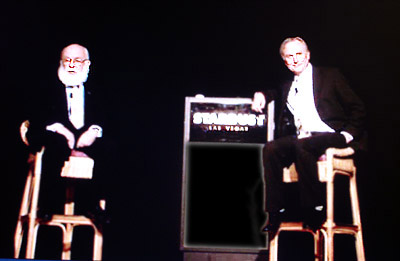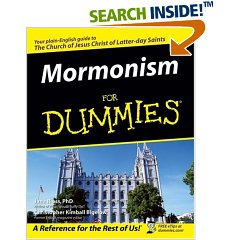|
Based on his book "The Demon Haunted World: Science as a candle in the dark"
Muses on the current state of scientific thought, which offers him
marvelous opportunities to entertain us with his own childhood experiences, the
newspaper morgues, UFO stories, and the assorted flotsam and jetsam of
pseudoscience. Along the way he debunks alien abduction, faith-healing, and
channeling; refutes the arguments that science destroys spirituality, and
provides a 'baloney detection kit' for thinking through political, social,
religious, and other issues."

The following are suggested as tools for testing arguments
and detecting fallacious or fraudulent arguments:
-
Wherever possible there must be independent confirmation of
the facts
-
Encourage substantive debate on the evidence by
knowledgeable proponents of all points of view.
-
Arguments from authority carry little weight (in science
there are no "authorities").
-
Spin more than one hypothesis - don't simply run with the
first idea that caught your fancy.
-
Try not to get overly attached to a hypothesis just because
it's yours.
-
Quantify, wherever possible.
-
If there is a chain of argument every link in the chain must
work.
-
"Occam's razor" - if there are two hypothesis that explain
the data equally well choose the simpler.
-
Ask whether the hypothesis can, at least in principle, be
falsified (shown to be false by some unambiguous test). In other
words, it is testable? Can others duplicate the experiment and
get the same result?
Additional issues are
-
Conduct control experiments - especially "double blind"
experiments where the person taking measurements is not aware of
the test and control subjects.
-
Check for confounding factors - separate the variables.
Common fallacies of logic and rhetoric
-
Ad hominem - attacking the arguer and not the
argument.
-
Argument from "authority".
-
Argument from adverse consequences (putting pressure on the
decision maker by pointing out dire consequences of an
"unfavourable" decision).
-
Appeal to ignorance (absence of evidence is not evidence of
absence).
-
Special pleading (typically referring to god's will).
-
Begging the question (assuming an answer in the way the
question is phrased).
-
Observational selection (counting the hits and forgetting
the misses).
-
Statistics of small numbers (such as drawing conclusions
from inadequate sample sizes).
-
Misunderstanding the nature of statistics (President
Eisenhower expressing astonishment and alarm on discovering that
fully half of all Americans have below average
intelligence!)
-
Inconsistency (e.g. military expenditures based on worst
case scenarios but scientific projections on environmental
dangers thriftily ignored because they are not "proved").
-
Non sequitur - "it does not follow" - the logic falls
down.
-
Post hoc, ergo propter hoc - "it happened after so it
was caused by" - confusion of cause and effect.
-
Meaningless question ("what happens when an irresistible
force meets an immovable object?).
-
Excluded middle - considering only the two extremes in a
range of possibilities (making the "other side" look worse than
it really is).
-
Short-term v. long-term - a subset of excluded middle ("why
pursue fundamental science when we have so huge a budget
deficit?").
-
Slippery slope - a subset of excluded middle - unwarranted
extrapolation of the effects (give an inch and they will take a
mile).
-
Confusion of correlation and causation.
-
Straw man - caricaturing (or stereotyping) a position to
make it easier to attack..
-
Suppressed evidence or half-truths.
-
Weasel words - for example, use of euphemisms for war such
as "police action" to get around limitations on Presidential
powers. "An important art of politicians is to find new names
for institutions which under old names have become odious to the
public"
|

Shadows of
Forgotten Ancestors:
A Search
for Who We Are
"Dazzling...a
feast. Absorbing and elegantly written, it tells of the origins of life on earth,
describes its variety and character, and culminates in a discussion of human
nature and the complex traces of humankind's evolutionary
past...it is an amazing story masterfully told."

Dragons of Eden
"Dr. Carl Sagan
takes us on a great reading adventure, offering his vivid and startling
insight into the brain of man and beast, the origin of human intelligence, the
function of our most haunting legends--and their amazing links to recent
discoveries. A history of the human brain from the big bang, fifteen
billion years ago, to the day before yesterday...It's a delight."
 Cosmos Cosmos
"The
best-selling science book ever published in the England language, Cosmos is a
magnificent overview of the past, present, and future of science. Brilliant and
provocative, it traces today's knowledge and scientific methods to their historical
roots, blending science and philosophy in a wholly energetic and irresistible
way. A companion volume to a popular television series and seventy-week New
York Times bestseller places fifteen billion years of evolution in an
accessible format."

Billions &
Billions:
Thoughts
on Life and Death at the Brink of the Millennium
"Carl Sagan's
last work seems to be the most powerful yet. He takes an unabashed look at
virtually every aspect of human existence and its impact on the home planet.
It a philosophical work that transcends the paradigms of the past,
dropping the excuses for excess such as patriotism, progress, and religion."
|
|

The Amazing Randi
and
Richard Dawkins
(Las Vegas Nevada - 2005,
2006) |
|
Atlas Shrugged,
by Ayn Rand
"The Only Book
Available That Will Arm You To Fight Nonsense! Do you ever listen
to people discuss mystical things with reverie and wonder why they
believe all that crap? Do you ever wonder what belief in all things
irrational ultimately does to the world? Here is your chance to find out. Atlas
Shrugged is the most important book ever written, and will provide you
with all the tools necessary to understand how to live a life of
reason and see the law of cause and effect in action when man tries to live
with out his most important tool, his mind."
Further resources:
Less serious sites:
|
|
 The
Selfish Gene, by The
Selfish Gene, by
Richard Dawkins
"Inheriting the
mantle of revolutionary biologist from Darwin, Watson, and Crick, Richard
Dawkins forced an enormous change in the way we see ourselves and
the world with the publication of The Selfish Gene. Suppose, instead of
thinking about organisms using genes to reproduce themselves, as we
had since Mendel's work was rediscovered, we turn it around and
imagine that 'our' genes build and maintain us in order to make more genes.
That simple reversal seems to answer many puzzlers which had stumped
scientists for years, and we haven't thought of evolution in the
same way since."

The Blind Watchmaker:
Why the Evidence of Evolution Reveals a Universe Without
Design, by
Richard Dawkins
"Patiently and
lucidly, this Los Angeles Times Book Award and Royal Society of
Literature Heinemann Prize winner identifies the aspects of the theory of
evolution that people find hard to believe and removes the barriers to
credibility one by one. As readable and vigorous a defense of Darwinism as has
been published since 1859. A vigorous and readable defense of Darwinism
which leaps effortlessly from the primeval soup to long rows of
taxonomy. Deep enough to be valuable to biologists, yet simple and
well-written so as to appeal to a mass audience."
|
amazon.com |
|

Mormonism, one of the world’s fastest growing
religions. But unless you were raised a Mormon...
|
|
|
PICK ONE UP FOR A FRIEND! |
|
|












